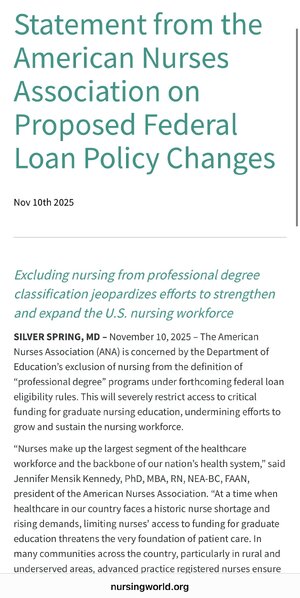- Messages
- 39,928
Excluding from GradPlus loan support (exclusion from caps) for graduate/advanced nursing degrees:

Statement from the American Nurses Association on Proposed Federal Loan Policy Changes
Excluding nursing from professional degree classification jeopardizes efforts to strengthen and expand the U.S. nursing workforcewww.nursingworld.org
““At a time when healthcare in our country faces a historic nurse shortage and rising demands, limiting nurses’ access to funding for graduate education threatens the very foundation of patient care. In many communities across the country, particularly in rural and underserved areas, advanced practice registered nurses ensure access to essential, high-quality care that would otherwise be unavailable. We urge the Department of Education to recognize nursing as the essential profession it is and ensure access to loan programs that make advanced nursing education possible.”
ANA encourages the Department to engage with nursing stakeholders and revise the “professional degree” definition to explicitly include nursing education pathways. Ensuring robust support for nursing education is essential to the future of safe, quality care delivery.”
Proposal to Implement Loan Caps Threatens Access to Professional Degree Programs

Proposal to Implement Loan Caps Threatens Access to Professional Degree Programs | Association of American Universities (AAU)
New proposals being considered by the Education Department will limit the number of degree programs that can be considered as “professional,” thereby curtailing the number of programs that will be eligible for higher loan limits set under H.R.1.
“
Earlier this month, a Department of Education-convened committee negotiated and reached consensus on draft regulations to implement student loan provisions in a bill (H.R.1) that Congress passed earlier this year. The new regulations will limit the number of degree programs that can be considered as “professional,” thereby curtailing the number of programs that will be eligible for higher loan limits set under H.R.1.
The bill, signed into law by President Trump this past July, imposes a lifetime cap of $100,000 in borrowing for graduate students and $200,000 for professional students. Annually, graduate students will be able to borrow no more than $20,500 while professional students will be able to borrow no more than $50,000 under the new law. The bill also terminates Grad PLUS loans, which graduate and professional students have used to pay for education expenses not covered by other financial aid, starting July 1, 2026.
Because of these changes, there was significant interest during the rulemaking session in determining which programs would qualify as “professional” and, therefore, be eligible for the higher $200,000 loan limit.
By the end of the session, the department and the Reimagining and Improving Student Education (RISE) committee agreed to recognize only 11 primary programs as well as some doctoral programs as professional degree programs. The 11 primary programs, which encompass 10 of the programs listed in H.R.1 plus one addition, include: pharmacy, dentistry, veterinary medicine, chiropractic, law, medicine, optometry, osteopathic medicine, podiatry, theology, and newly added, clinical psychology.
According to Inside Higher Ed, the committee adopted a narrow definition of a professional degree program despite stakeholders pushing for “high-demand health-care professions, such as physician assistants, nurse practitioners and audiologists, as well as programs in architecture, accounting, education and social work to all be considered professional and thus eligible for the higher borrowing limits.”…”



